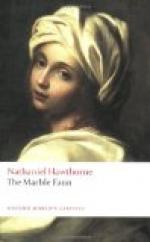Donatello, brisk and cheerful as he seemed before, showed a sensibility to Miriam’s gladdened mood by breaking into still wilder and ever-varying activity. He frisked around her, bubbling over with joy, which clothed itself in words that had little individual meaning, and in snatches of song that seemed as natural as bird notes. Then they both laughed together, and heard their own laughter returning in the echoes, and laughed again at the response, so that the ancient and solemn grove became full of merriment for these two blithe spirits. A bird happening to sing cheerily, Donatello gave a peculiar call, and the little feathered creature came fluttering about his head, as if it had known him through many summers.
“How close he stands to nature!” said Miriam, observing this pleasant familiarity between her companion and the bird. “He shall make me as natural as himself for this one hour.”
As they strayed through that sweet wilderness, she felt more and more the influence of his elastic temperament. Miriam was an impressible and impulsive creature, as unlike herself, in different moods, as if a melancholy maiden and a glad one were both bound within the girdle about her waist, and kept in magic thraldom by the brooch that clasped it. Naturally, it is true, she was the more inclined to melancholy, yet fully capable of that high frolic of the spirits which richly compensates for many gloomy hours; if her soul was apt to lurk in the darkness of a cavern, she could sport madly in the sunshine before the cavern’s mouth. Except the freshest mirth of animal spirits, like Donatello’s, there is no merriment, no wild exhilaration, comparable to that of melancholy people escaping from the dark region in which it is their custom to keep themselves imprisoned.
So the shadowy Miriam almost outdid Donatello on his own ground. They ran races with each other, side by side, with shouts and laughter; they pelted one another with early flowers, and gathering them up twined them with green leaves into garlands for both their heads. They played together like children, or creatures of immortal youth. So much had they flung aside the sombre habitudes of daily life, that they seemed born to be sportive forever, and endowed with eternal mirthfulness instead of any deeper joy. It was a glimpse far backward into Arcadian life, or, further still, into the Golden Age, before mankind was burdened with sin and sorrow, and before pleasure had been darkened with those shadows that bring it into high relief, and make it happiness.
“Hark!” cried Donatello, stopping short, as he was about to bind Miriam’s fair hands with flowers, and lead her along in triumph, “there is music somewhere in the grove!”
“It is your kinsman, Pan, most likely,” said Miriam, “playing on his pipe. Let us go seek him, and make him puff out his rough cheeks and pipe his merriest air! Come; the strain of music will guide us onward like a gayly colored thread of silk.”




